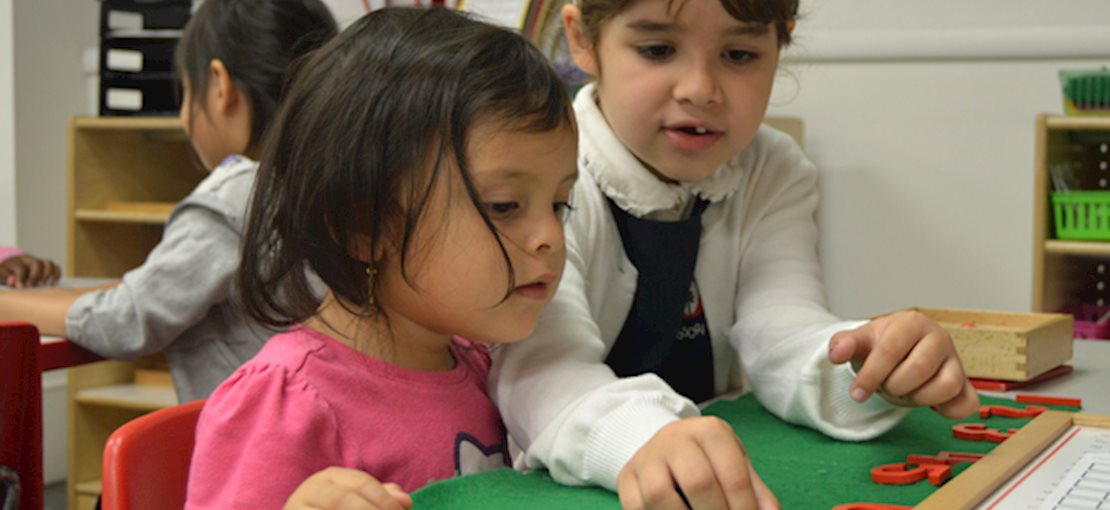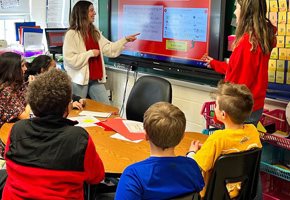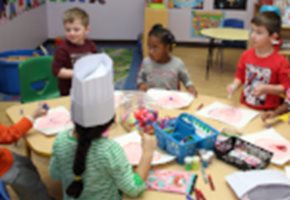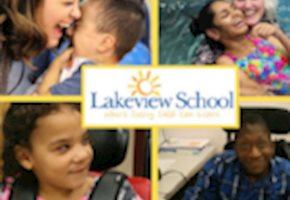As Montessori educators, the most common question we get is “What is Montessori all about?” The answer is simple: “It’s all about the child.” Below is a Q&A we like to call “Montessori 101”: an explanation of the origin and philosophy of Montessori and how Apple Montessori Schools unique approach to Montessori education can help your child develop a love of learning for life.
What exactly is Montessori anyway?
Montessori is a philosophy of teaching inspired by Maria Montessori, an innovator in early childhood education at the turn of the 19th century. She studied children – literally watched them learn – and found that learning occurs differently for different children. Montessori believed that teachers are responsible for creating a fascinating and engaging environment in which children are given the freedom to develop and explore at their own pace. She believed children learn the most from birth to 6 years of age so the infant, toddler, preschool, and kindergarten years are a critical time for learning.
How is the Montessori method different from traditional learning models?
The Montessori method embraces the innate curiosity and vast potential of each child to flourish and develop a lifelong love of learning. Our core belief is that children are naturally interested in learning and achieving. We nurture that inner drive in all aspects of children’s development – intellectually, socially, physically, emotionally, and ethically, allowing them to develop at their own pace in an atmosphere of cooperation rather than competition.
What does a Montessori classroom look like?
What you won’t see in entering a Montessori classroom is a teacher standing in front of a classroom delivering a lecture. What you will find is children engaged in various activities, guided by their teacher, and determined by their natural interests and capabilities. You might find a child busy with a button sewing project in one corner and another working on a puzzle in another – all are hands-on projects that they can see, touch, and experience.
Why does the Montessori method believe in mixed-age classrooms? Doesn’t that slow down learning for the older or more advanced students?
On the contrary, mixed-age classrooms may help the more advanced learners most of all! Because Montessori-schooled children are free to follow their passions at their own pace, no one is ever held back because they are bored or uninspired. Older children can pursue more advanced learning opportunities, while at the same time, enrich their classroom experience and gain self-confidence by helping to inspire and guide younger or less advanced students.
How do Montessori-educated children fare later in life?
Research studies show that Montessori children are well prepared for later life academically, socially, and emotionally. In addition to scoring well on standardized tests, Montessori children are ranked above average on such criteria as following directions, turning in work on time, using basic skills, showing responsibility, asking thought-provoking questions, and adapting to new situations.
What distinguishes Apple Montessori Schools from other Montessori programs?
Not all Montessori schools are created equal. Apple Montessori Schools offer what we like to call “Montessori Plus” – an exceptional learning experience well beyond day care focused on nurturing the whole child. Key differentiators include our advanced technology curriculum including FasTracKids, an accelerated enrichment program with Smart Board lessons. Parents also love our reading program where children learning to read by age 4 is the norm, not the exception. Plus we offer foreign language curriculum, a Character Development program, summer camps with swimming pools, and state-of-the-art parent communication software – all in a safe, fun and caring environment.
In over 40 years, we are proud to say we have set the foundation for a lifetime of school success for thousands of children thanks to our inspiration – Maria Montessori.
Read More at http://www.applemontessorischools.com/






Add A Comment
Thank you for your comment.
Sorry! There was a problem with your comment submission. Please try again.
Comment
Allowed HTML: <b>, <i>, <u>, <a>
Comments
Thank you for your comment.
Sorry! There was a problem with your comment submission. Please try again.
Thank you for your comment.
Sorry! There was a problem with your comment submission. Please try again.